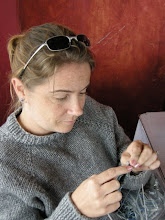Saturday, April 24, 2004
We did the distribution in Lokando yesterday. It went really well, and the team worked like clockwork. We’re all exhausted and proud and relieved. Far from being any hindrance at all yesterday, the military unit in the town provided security for the guys who were bringing the kits from the boats up to the distribution site, and guarded the kits at the distribution site. Now, that was yesterday, and who knows what happened last night when everyone went home with their stuff. At least they didn’t cause problems.
Long before doing each distribution, a team of “animateurs” or field agents visit the target community and do an initial evaluation. This evaluation includes focus groups and individual interviews, with community leaders and with randomly chosen individuals. The field agents also make a map of the village and surrounding smaller villages, including sites of their fields and other community assets or challenges.
After doing the initial evaluation, and determining that we need to work in that community, we plan the survey. The survey lasts for about five days. During this time, the field agents go from door to door interviewing people in the area based on a standard interview format. Nearly everyone in the target communities will be interviewed, and the field agents have even been known to go look for people at their fields. Based on the interview results, we target the neediest people in a community for immediate assistance. Since nearly everyone in these places is destitute, it isn’t easy, so we are planning a second round of assistance for people who weren’t included in the targeting the first time.
After the survey and targeting, the field agents return to the village where the distribution will take place. The first thing they do is finish up any surveys they might not have been able to be to. Then, they distribute vouchers to all those who meet the targeting criteria. Each voucher has the person’s name and a unique number. The people need to bring this voucher with them to the distribution. This helps us to make sure that we are getting the right people. We keep the surveys and they keep the vouchers, and then the two have to match the day of the distribution or they don’t get anything. There have been a few cases of people selling vouchers, stealing vouchers, or claiming that they were targeted but lost their voucher, but not too many. The kits that we are giving out include items such as cooking pots, cooking utensils, a tarp for shelter, blankets, soap, a jerry can for water, rope, a hatchet and a machete.
Under normal circumstances, no development agency in its right mind would just give things out like this. I’m sure that you can imagine the problems that would be (and were when that was the approach in the past) associated with this kind of an approach: breakdown of local markets, removal of the motivation to produce, humiliation for being beholden to charity, etc. In the case of an emergency, however, people literally have nothing, and in order for them to even have a chance to get back on their feet, they need at least some basic items. Ideally, this will be the last time anyone gives them these basics.
Eventually, each village where we’ve done a distribution will host a seed fair sponsored by my agency and our local partner.
At one point, when I was reading some book about some crazy white guy adventuring for no good reason in the forest of the Congo basin, I wondered how people were able to live in the jungle before, but now they can’t. Ok, I don’t normally wonder that, because when you’re out here, it just doesn’t matter, but since it occurred to me, and might occur to someone else, I gave myself an answer. It has been generations since these people have lived full-time in the forest. They probably still have some local knowledge about what is edible, how to hunt, how to protect themselves from animals and the elements, but basically for at least two generations, they have been living in villages, wearing clothes, cooking in metal pots over a fire, etc. Living full-time in the forest is no more natural or normal for them than it would be for most of us. Furthermore, it is a humiliation, culturally, since it is believed that people who do live in the forest are more like animals.
The Kindu Menu
Breakfast:
-Bread, staled to perfection, covered with cheese of the most mediocre quality, or margarine and overly-sweet preserves;
-A half-coffee, and half-chickory mix, with your choice of powdered milk or sugar
-Boiled eggs
-Cold boiled sardines
Lunch:
-Something very like spinach but not quite
-Rice
-Bananas or plantains fried to perfection
-Bean dish of the day
-Your choice of fish (capitane), goat, or chicken
Dinner:
-Goat kabob, roasted chicken, or fish
-Side of fries, fried plantains, or fried manioc, depending on what we felt like buying for you at the market today
-Local beer, coke, or imported beer, if you are lucky
Sunday, April 25, 2004
Subscribe to:
Post Comments (Atom)


No comments:
Post a Comment